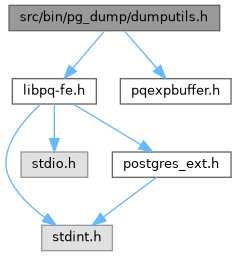

Go to the source code of this file.
Macros | |
| #define | PGDUMP_STRFTIME_FMT "%Y-%m-%d %H:%M:%S %Z" |
Macro Definition Documentation
◆ PGDUMP_STRFTIME_FMT
Function Documentation
◆ buildACLCommands()
|
extern |
Definition at line 104 of file dumputils.c.
References appendPQExpBuffer(), appendPQExpBufferStr(), createPQExpBuffer(), PQExpBufferData::data, destroyPQExpBuffer(), fb(), fmtId(), free, i, j, PQExpBufferData::len, name, parseAclItem(), parsePGArray(), pg_malloc_array, printfPQExpBuffer(), subname, and type.
Referenced by buildDefaultACLCommands(), dumpACL(), dumpRoleGUCPrivs(), and dumpTablespaces().
◆ buildDefaultACLCommands()
|
extern |
Definition at line 366 of file dumputils.c.
References acldefault(), appendPQExpBuffer(), buildACLCommands(), createPQExpBuffer(), PQExpBufferData::data, destroyPQExpBuffer(), fb(), fmtId(), and type.
Referenced by dumpDefaultACL().
◆ buildShSecLabelQuery()
|
extern |
Definition at line 678 of file dumputils.c.
References appendPQExpBuffer(), and fb().
Referenced by buildShSecLabels(), and dumpDatabase().
◆ create_or_open_dir()
Definition at line 940 of file dumputils.c.
References fb(), mkdir, pg_check_dir(), pg_dir_create_mode, and pg_fatal.
Referenced by InitArchiveFmt_Directory(), and main().
◆ emitShSecLabels()
|
extern |
Definition at line 696 of file dumputils.c.
References appendPQExpBuffer(), appendPQExpBufferStr(), appendStringLiteralConn(), conn, fmtId(), i, label, PQgetvalue, and PQntuples.
Referenced by buildShSecLabels(), and dumpDatabase().
◆ generate_restrict_key()
Definition at line 973 of file dumputils.c.
References buf, fb(), i, idx(), palloc(), pg_strong_random(), and restrict_chars.
◆ makeAlterConfigCommand()
|
extern |
Definition at line 865 of file dumputils.c.
References appendPQExpBuffer(), appendPQExpBufferStr(), appendStringLiteralConn(), buf, conn, fb(), fmtId(), name, pg_free(), pg_strdup(), SplitGUCList(), type, and variable_is_guc_list_quote().
Referenced by dumpDatabaseConfig(), and dumpUserConfig().
◆ quoteAclUserName()
|
extern |
Definition at line 585 of file dumputils.c.
References appendPQExpBufferChar(), fb(), input, and output.
Referenced by getNamespaces().
◆ sanitize_line()
Definition at line 52 of file dumputils.c.
References fb(), pg_strdup(), and str.
Referenced by _printTocEntry(), dumpDatabases(), dumpTableData(), dumpUserConfig(), and PrintTOCSummary().
◆ SplitGUCList()
Definition at line 765 of file dumputils.c.
References fb(), and pg_malloc_array.
Referenced by makeAlterConfigCommand().
◆ valid_restrict_key()
Definition at line 997 of file dumputils.c.
References fb(), restrict_chars, and restrict_key.
◆ variable_is_guc_list_quote()
Definition at line 730 of file dumputils.c.
References name, and pg_strcasecmp().
Referenced by dumpFunc(), and makeAlterConfigCommand().